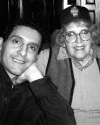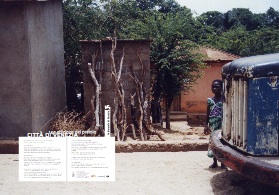LITTLE KINGS

MOTHER-TONGUE: ITALIAN AMERICAN SONS & MOTHERS
Marylou Tibaldo-Bongiorno & Jerome Bongiorno

Together with her husband Jerome, Marylou Tibaldo-Bongiorno returns to the subject of Italian Americans, interviewing famous mothers and sons, including, among others, Martin and Catherine Scorsese, John and Katherine Turturro, Carl and Mary Capotorto, Rudy Giuliani and Helen Giuliani, and Robert and Vera Viscusi. The film focuses on both its subjects in and of themselves and the more or less complex relationships of these particular Italian American families.
Mother-Tongue is our exploration of the special bond that exists between Italian American men and their mothers.
by Giuliana Muscio

MOTHER-TONGUE Screenings, Lectures & Press
Mother-Tongue: Italian American Sons & Mothers
Mamma Mia!
So the boyfriend's on the phone with his mother for a half-hour, talking about "the weather, his laundry, what he ate." What's the deal? In Saturday's 9 p.m. MetroGuide premiere of "Mother-Tongue: Italian-American Sons and Mothers," frustrated filmmaker Marylou Bongiorno tries to figure it out by visiting local Italian men around New York, hearing about their beloved moms and their often complex relationships with their dads. There's Martin Scorsese, who casts his mom in his movies, giving her "just the barest outline" before letting her loose as Joe Pesci's mom in "GoodFellas," for instance; and we get to watch the wonderful clips that were the result. (Mom's ultimate advice? "Eat first.") John Turturro and his mom talk about his playing a character based on his dad in the movie "Mac"; plus mom helps brother Nick of "NYPD Blue" belt out The "Lady is a Tramp" for Conan O'Brien. (She doesn't like crap games with barons and earls.) Rudy Giuliani plays an Italian mom on "Saturday Night Live," then confesses to Bongiorno's camera that during his political career his mom has "even at times called up reporters and complained to them" about their Rudy coverage. "Mother-Tongue" is the kickoff of Metro's new series "New York Stories," a weekly Saturday forum for local documentary filmmakers that's one of five new series debuting this month in celebration of MetroChannels' first anniversary.
Featuring director Martin Scorsese, NYC Mayor Rudy Giuliani, actors John Turturro and Carl Capotorto, rock singer Pat DiNizio, author Robert Viscusi, and performance artist Mario Giacalone. Winner of the New York Festivals Gold Medal and nominated for an Emmy Award. Screens on Time Warner, The MetroChannel.

"Poignant and comical"
6 Giugno 2007 - 15:28 - 63 Letture
Mother Tongue e Revolution ’67
Due documentari presentati dalla regista Marylou Tibaldo- Bongiorno indagano sui luoghi comuni sugli italiani d’America. Il tema della questione razziale diventerà un film prodotto da Spike Lee.
Insieme a Nancy Savoca, Camilla Calamandrei e Susan Caverna Lloyd, Marylou Tibaldo-Bongiorno è una delle donne registe protagoniste della rassegna sul cinema italo-americano contemporaneo. Alla Mostra è presente, insieme al marito Jerome Bongiorno, con due documentari Mother Tongue e Revolution ’67 ed il lungometraggio Little Kings, programmato in piazza per domani sera
Mother Tongue, presentato ieri, è un documentario, che indagando sui luoghi comuni della cultura italo-americana, si basa su interviste a uomini celebri di origine italiana come John Turturro, Rudolph Giuliani, Martin Scorsese ed alle rispettive madri. Scopriamo attraverso le interviste come le rispettive mamme abbiano segnato la carriera di questi uomini di successo. Non a caso la madre di Scorsese appare in più di un film del regista.
Revolution ’67, programmato questa mattina, è invece incentrato sulle ribellioni afro americane di Newark nell’estate del 1967, attraverso i racconti di testimoni diretti, tra cui Tom Hayden, marito di Jane Fonda e leader della nuova sinistra americana. L’elemento italo-americano che emerge evidente è il problema del razzismo imputato agli italiani d’America.
“Nei nostri lavori documentari - ha raccontato la Bongiorno incontrando oggi il pubblico del Teatro Sperimentale - siamo voluti partire dagli stereotipi della cultura italo-americana come la figura della madre ed il problema del razzismo per tracciare un elemento d’identità e per sottolineare i cambiamenti rispetto a certi evidenti pregiudizi. Nel caso degli scontri razziali di Newark per esempio fa da contraltare alle figure italo-americane dei poliziotti violenti e del sindaco repressivo l’attivista Richard che si schiera a difesa degli afroamericani”.
Sui temi di Revolution ‘67 la Bongiorno sta lavorando ad un film di finzione che vede come produttore esecutivo Spike Lee che aveva già trattato il tema del problema razziale tra la comunità italo-americana e quella afro-americana in Fa’ la cosa giusta. Nella direzione del binomio Italia America la Bongiorno e suo marito stanno anche lavorando ad un progetto documentario su New Orleans e Venezia a partire dal tema dell’acqua.
Si ringrazia per la cortese collaborazione lo Studio Morabito


"Rich, fascinating, talky and funny!"
Eleanor O'Sullivan

"ltalian-American to the bone!"
Matt Zoller Seitz

"Delizioso, ironico, divertentissimo
documentario!"
Silvia Zerilli

"Best Bets"

Bongiorno, Pesaro...
26/06/2007 - La regista guida la carica italo-americana alla Mostra. Nel segno di mamme (e mammoni...) DOC
Bongiorno, Pesaro... Con Nancy Savoca, Camilla Calamandrei e Susan Caverna Lloyd, Marylou Tibaldo-Bongiorno è una delle registe protagoniste della rassegna sul cinema italo-americano al festival di Pesaro: per lei due documentari - Mother Tongue e Revolution ’67 - e il lungometraggio Little Kings, programmato in piazza per domani sera. Mother Tongue indaga sui luoghi comuni della cultura italo-americana, attraverso interviste a, tra gli altri, John Turturro, Rudolph Giuliani, Martin Scorsese e alle rispettive madri, che spesso - è il caso del regista di Quei bravi ragazzi - ne hanno segnato incisivamente la carriera. Le ribellioni afro-americane di Newark nell’estate del 1967, invece, sono al centro di Revolution ’67, che raggruppa varie testimonianze, tra cui quela di Tom Hayden, marito di Jane Fonda e leader della nuova sinistra americana: il focus qui è sul razzismo della comunità italo-americana. “Nei nostri lavori documentari - dice la Bongiorno - siamo voluti partire dagli stereotipi della cultura italo-americana, quali figura della madre e il razzismo, per tracciare un elemento d’identità e sottolineare i cambiamenti rispetto a certi evidenti pregiudizi". Sui temi di Revolution ‘67, la Bongiorno sta lavorando a un film di finzione prodotto da Spike Lee, che già aveva inquadrato il problema razziale tra la comunità italo-americana e quella afro-americana in Fa’ la cosa giusta. Sempre sulla relazione Italia-America, la Bongiorno e il marito hanno in progetto un documentario su New Orleans e Venezia legate dall'acqua.

-
•September 8, 2006 Venice Film Festival, Venice, Italy Manifesto Cinema.pdf
-
•June 24 - July 2, 2007 Pesaro Film Festival, Pesaro, Italy Pesaro catalogo_2007.pdf link
-
•June 21, 2011 NOIAW Casa Belvedere, Staten Island, NY SILive.com Italian-American group in the spotlight.pdf
-
•May 31, 2018 Women's Place, Borders and Intersecting Spaces in Italian Culture, Intersections 2018, Florence, Italy
Press
Screenings & Lectures


Mamma Mia!
5.31.18 Screening of Mother-Tongue: Italian American Sons & Mothers documentary
Women’s Place, Borders and Intersecting Spaces in Italian Culture
Intersections 2018, Florence, Italy
“An important historical document on motherhood…[Mother-Tongue] gave us the opportunity to discuss the differences between Italian and Italian-American cultures, and the perception of Italianness.
Everybody agreed about one point: the movie shows a pattern, a specific idea of "Italian mother", all of the mothers in the film, in different ways, embody this prototype (the mother sacrificing everything for the family, the domestic space as motherly space, the protective mother, the "safe place" etc.)."
~Dr. Marianna Orsi, Indiana University Bloomington





